Have you ever wondered what the fastest car in the world is? The pursuit of automotive speed has captivated engineers, designers, and enthusiasts for over a century. Today, cutting-edge hypercars push the boundaries of what's possible on four wheels, achieving velocities that were once unimaginable.
But determining the true "fastest car" isn't as straightforward as you might think. Factors like acceleration, top speed, and even the definition of a production vehicle all come into play. In this article, you'll discover the current contenders for the fastest car in the world title, and learn what makes these engineering marvels so extraordinary.
Criteria For the Fastest Car in the World Title
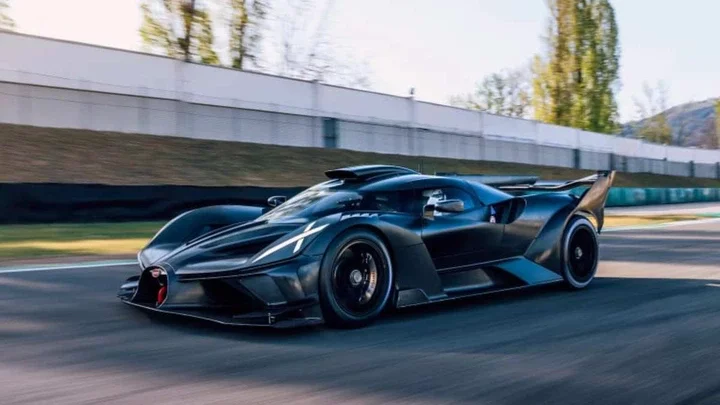
The title of "fastest production car" typically refers to street-legal vehicles manufactured in series and available for public purchase.
Top speed is the primary factor in determining the fastest car in the world. This metric represents the maximum velocity a vehicle can achieve under optimal conditions. However, other performance indicators like acceleration (0-60 mph time) and quarter-mile times also contribute to a car's overall speed profile.
For a speed record to be officially recognized, it must be verified by independent organizations. Guinness World Records is one such authority that authenticates top speed claims. These validations often require multiple runs in opposite directions to account for wind and road variations.
Production Requirements
To qualify as the fastest production car in the world, a vehicle must meet specific criteria:
Be street-legal in its country of origin
Have a minimum production run (typically at least 20-30 units)
Use the same specifications as the cars available to customers
These requirements ensure that the record-holding vehicle is not a one-off prototype but a genuine production model accessible to consumers, albeit often at astronomical prices.
The title of fastest car in the world is a constantly evolving accolade. As automotive technology advances, new contenders regularly emerge to challenge existing speed records. This dynamic competition drives innovation in aerodynamics, power train efficiency, and lightweight materials, pushing the boundaries of what's possible in automotive engineering.
Factors That Enable Speed
The fastest car in the world achieves its incredible velocity through a combination of cutting-edge engineering and design. Here are ten crucial factors that contribute to a vehicle's ability to reach record-breaking speeds:
Aerodynamics
Sleek, wind-cheating profiles are essential for minimizing air resistance. The fastest car in the world typically features a low, streamlined body with carefully sculpted surfaces to reduce drag and improve stability at high speeds.
Lightweight Construction
Every ounce matters when pushing the limits of speed. Advanced materials like carbon fiber, titanium, and aerospace-grade aluminum help shed weight without sacrificing structural integrity.
Powerful Engines
Massive horsepower is a prerequisite for extreme velocity. The world's fastest cars often boast engines with multiple turbochargers or superchargers, producing well over 1,000 horsepower.
Transmission and Drivetrain
Efficiently transferring power to the wheels is crucial. Cutting-edge transmissions, often dual-clutch or sequential designs, ensure rapid gear changes and minimal power loss.
Tires and Wheels
Special high-speed rated tires are necessary to withstand the extreme forces at play. Lightweight yet strong wheels help reduce unsprung weight and improve handling.
Suspension and Chassis Tuning
A finely-tuned suspension system keeps the car planted at high speeds, while a rigid chassis provides the necessary stability and control.
Cooling Systems
Managing heat is critical when pushing engines to their limits. Advanced cooling systems prevent overheating and maintain optimal performance.
Downforce Generation
Active aerodynamic elements like adjustable spoilers and underbody diffusers create downforce, improving traction and stability at high speeds.
Electronic Aids
Sophisticated traction control, stability systems, and launch control help drivers harness the car's immense power safely and effectively.
Fuel and Lubrication
High-octane racing fuels and advanced lubricants ensure the engine can perform at its peak, contributing to the overall speed potential of the world's fastest cars.
The Fastest Car in the World?
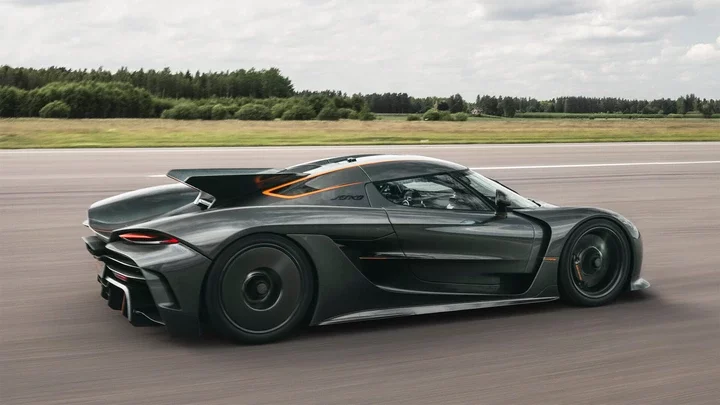
The Koenigsegg Jesko Absolut currently holds the title of the fastest car in the world. This Swedish hypercar is the culmination of decades of automotive engineering and represents the pinnacle of speed and performance.
The Jesko Absolut is a limited-production, high-performance vehicle designed to break speed records. It's a two-door, two-seater coupe with a sleek, aerodynamic body that's been meticulously crafted to slice through the air with minimal resistance.
Koenigsegg, founded in 1994 by Christian von Koenigsegg, has a history of pushing the boundaries of automotive performance. The Jesko Absolut, named after Christian's father, was unveiled in 2020 as the company's most extreme creation yet. The Koenigsegg Jesko Absolut costs $2,840,000.
Key Features include the following:
Twin-turbocharged 5.0-liter V8 engine
1,600 horsepower on E85 biofuel
9-speed multi-clutch transmission
Carbon fiber monocoque chassis
Active aerodynamics
Triplex suspension system
3D-printed titanium components
Revolutionary "Light Speed Transmission"
0.278 Cd Drag Coefficient
8.6:1 Compression.
The Jesko Absolut's claim to the title of fastest car in the world is based on its theoretical top speed of over 330 mph. This incredible velocity is achieved through a combination of its powerful engine, advanced aerodynamics, and innovative transmission system. The car's low drag coefficient of just 0.278 allows it to slip through the air with minimal resistance, while its lightweight construction and advanced suspension system ensure stability at extreme speeds.
Top 10 Fastest Cars in the World
When it comes to automotive engineering, speed reigns supreme. Let's dive into the details of the world's fastest cars, each a marvel of design and technology pushing the boundaries of what's possible on four wheels.
Koenigsegg Jesko Absolut - 330-350 miles per hour
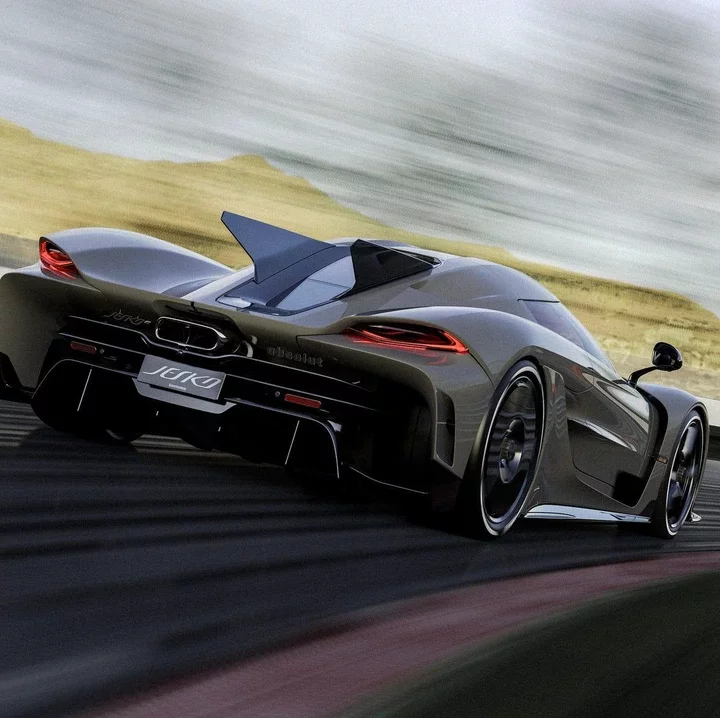
The Koenigsegg Jesko Absolut stands as the current titan in the realm of speed. The Koenigsegg Jesko Absolut has a top speed of 330-350 miles per hour (531-563 kilometers per hour), making it the fastest car in the world. Its 5.0-liter twin-turbo V8 engine produces a staggering 1,600 horsepower, while its aerodynamic design slices through the air with minimal resistance.
SSC Tuatara - 295 mph
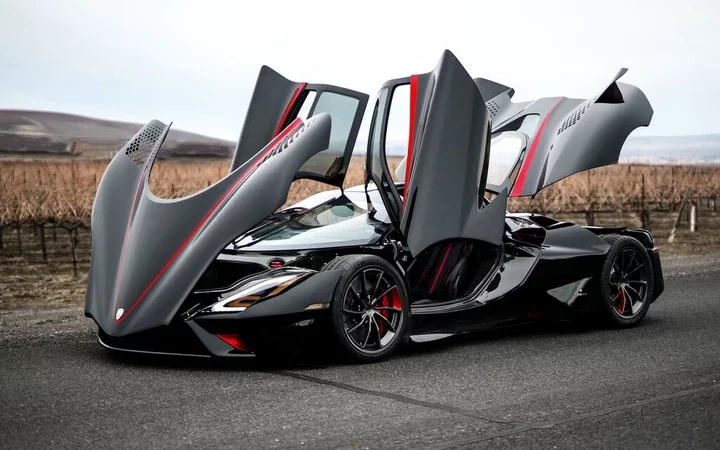
America's contender, the SSC Tuatara, claims a verified top speed of 295 mph (474.8 kilometers per hour). This sleek speedster features a 5.9-liter twin-turbo V8, generating up to 1,750 horsepower. Its carbon fiber body and active aerodynamics contribute to its remarkable performance.
Bugatti Chiron Super Sport 300+ - 304.77mph

The Bugatti Chiron Super Sport 300+ achieved a record-breaking 304.77mph in 2019. Its quad-turbocharged 8.0-liter W16 engine delivers 1,600 horsepower, while its elongated body enhances stability at extreme speeds.
Hennessey Venom F5 - Top speed of over 310.7 mph
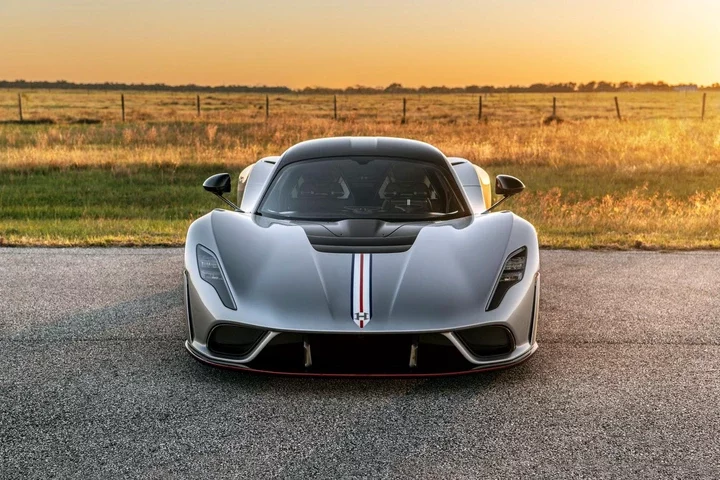
The Hennessey Venom F5 is a high-performance hypercar with a twin-turbo V8 engine, capable of speeds over 300 mph. Its twin-turbo V8 produces 1,817 horsepower. The car's lightweight carbon fiber chassis and aerodynamic design are key to its performance. On July 30, 2024 the Venom F5 broke the standing 1⁄2 mile (805 m) record with a time of 14.44 seconds at 219 mph (353 km/h).
Rimac Nevera - 258 mph
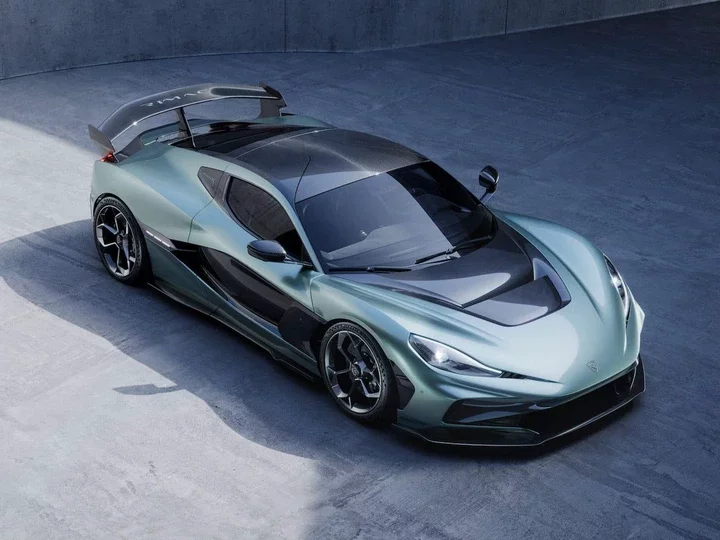
Croatia's Rimac Nevera proves electric cars can compete in the speed arena. This all-electric hypercar boasts 1,914 horsepower from its four electric motors, achieving a top speed of 258 mph (412 kilometers per hour). Its instant torque and advanced power management system showcase the potential of electric performance vehicles.
McLaren Speedtail - 250 mph
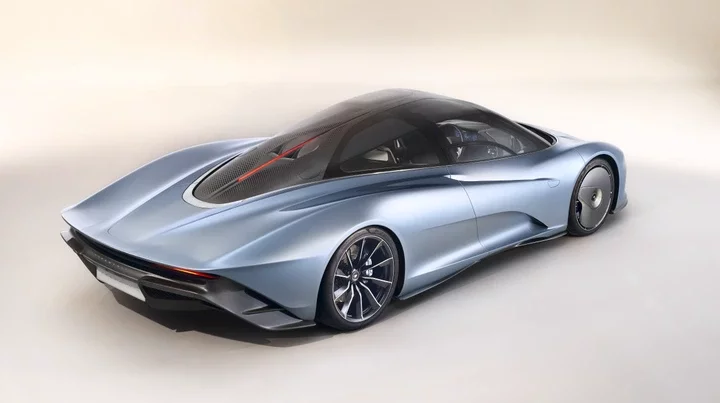
The McLaren Speedtail is a hyper-GT that embodies the pinnacle of aerodynamic efficiency. With its elongated carbon fiber body and hybrid powertrain, this car achieves a breathtaking top speed of 250mph. It boasts of 1,055-horsepower twin-turbo 4.0-liter V8 engine and a hybrid KERS system. The Speedtail's unique three-seat configuration, with the driver centrally positioned, harkens back to the iconic McLaren F1. It can accelerate from 0 to 60 miles per hour in 2.9 seconds and from 0 to 186 miles per hour in 12.8 seconds.
Koenigsegg Regera - 250 mph
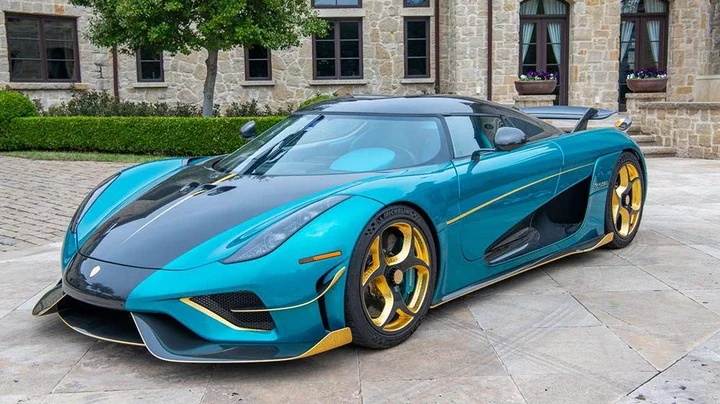
Swedish hypercar manufacturer Koenigsegg has created a technological tour de force with the Regera. This plug-in hybrid combines a twin-turbo V8 with three electric motors, producing over 1,500 horsepower. The Regera's innovative direct drive system eliminates the need for a traditional gearbox, enabling seamless acceleration to its 250 mph top speed. It can go from 0 to 250 mph in one gear. The Regera is the fastest hybrid vehicle in the world and holds the record for the quickest 0-249-0 mph time of any production car at 28.81 seconds.
Aston Martin Valkyrie - 250 mph
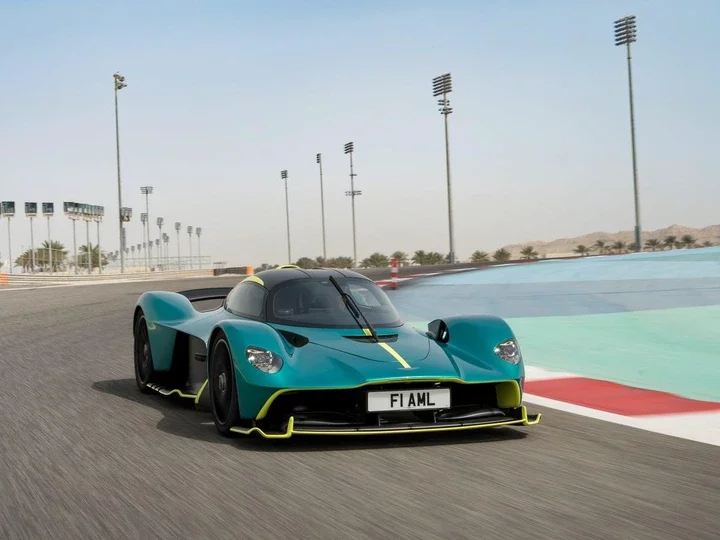
Developed in collaboration with Red Bull Racing, the Aston Martin Valkyrie brings Formula 1 technology to the road. Its naturally-aspirated V12 engine, coupled with a hybrid system, delivers extraordinary performance. The Valkyrie's advanced aerodynamics and lightweight construction contribute to its estimated 250 mph top speed. It can go from 0 to 62 miles per hour in 2.2 seconds.
Pagani Huayra - 238 mph
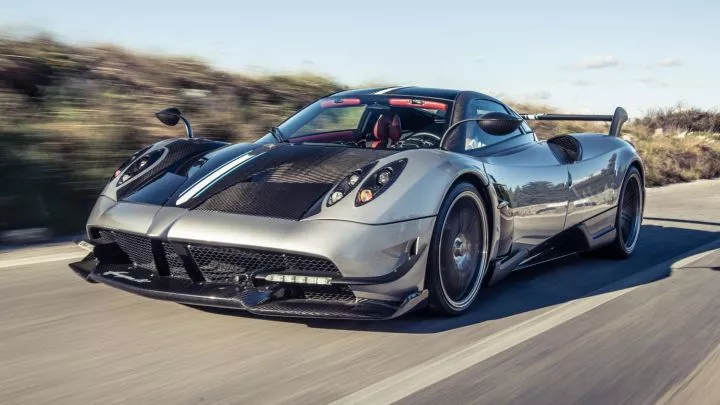
The Pagani Huayra combines Italian artistry with cutting-edge engineering. Its twin-turbocharged V12 engine, developed by Mercedes-AMG, propels this work of art to 238 mph. The Huayra's active aerodynamics and titanium exhaust system showcase Pagani's attention to detail and performance. It can accelerate from 0 to 60 miles per hour (97 kilometers per hour) in 2.8 seconds.
Chevrolet Corvette ZR1 - 233 mph
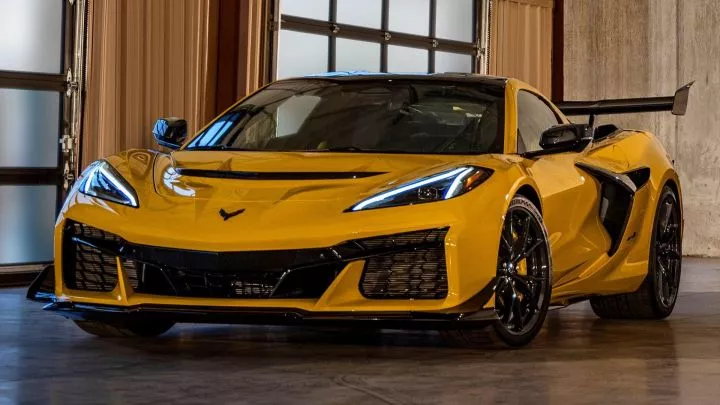
The Chevrolet Corvette ZR1 proves that American muscle can compete with the world's best. Its supercharged V8 engine produces 1069 horsepower, enabling a top speed of 233 mph. The ZR1's aggressive aerodynamics and advanced cooling systems ensure it can maintain its performance on both road and track.
Safety Considerations for Fast Cars
When it comes to the fastest car in the world, safety should always be a top priority. Here are are some of the crucial safety considerations for high-performance vehicles:
Advanced Braking Systems
High-speed cars require exceptional stopping power. Advanced braking systems, including carbon-ceramic brakes and anti-lock braking systems (ABS), are essential for safely decelerating from extreme speeds.
Aerodynamic Design
Proper aerodynamics play a vital role in maintaining stability at high velocities. Features like spoilers, diffusers, and underbody panels help keep the fastest car in the world firmly planted on the road.
Reinforced Chassis and Safety Cage
A robust chassis and integrated safety cage protect occupants in case of a collision. These structures are designed to absorb and disperse impact energy, reducing the risk of injury.
Advanced Driver Assistance Systems (ADAS)
Modern fast cars often incorporate ADAS technologies such as lane departure warnings, adaptive cruise control, and collision avoidance systems to enhance safety during high-speed driving.
High-Performance Tires
Specialized tires designed for extreme speeds are crucial. These tires offer superior grip, heat resistance, and stability to maintain control at high velocities.
Fire Suppression Systems
Given the high-performance nature of these vehicles, onboard fire suppression systems are a critical safety feature to quickly extinguish potential fires.
Enhanced Cooling Systems
Efficient cooling systems prevent overheating of critical components like the engine and brakes, ensuring consistent performance and safety during high-speed driving.
Lightweight, High-Strength Materials
The use of advanced materials like carbon fiber and high-strength alloys reduces weight while maintaining structural integrity, improving both performance and safety.
Professional Driver Training
Perhaps the most crucial safety consideration is proper driver training. Operating the fastest car in the world requires exceptional skill and experience to handle its extreme capabilities safely.
The Future of High-Speed Cars
The future of high-speed cars is an exciting frontier in automotive engineering, promising to push the boundaries of what we consider the fastest car in the world. As technology advances, we can expect to see remarkable innovations that will redefine speed and performance on the road.
Electric Power trains
One of the most significant developments in the pursuit of the fastest car in the world is the adoption of electric power trains. Electric motors offer instant torque and can potentially deliver higher top speeds than traditional combustion engines. Companies like Rimac and Tesla are already showcasing the potential of electric hypercars, with acceleration figures that rival or surpass their gasoline-powered counterparts.
Aerodynamic Advancements
Future high-speed cars will likely feature even more sophisticated aerodynamics. Active aero elements, such as adjustable spoilers and underbody diffusers, will become more prevalent. These systems will adapt in real-time to optimize downforce and reduce drag, allowing cars to achieve higher top speeds while maintaining stability.
Lightweight Materials
The use of advanced materials like carbon fiber, titanium alloys, and even graphene will play a crucial role in creating lighter, stronger vehicles. Reducing weight while increasing structural rigidity will enable cars to accelerate faster and reach higher top speeds, potentially setting new records for the fastest car in the world.
AI and Autonomous Systems
Artificial intelligence and autonomous driving technologies may seem counterintuitive for high-speed cars, but they could play a significant role in optimizing performance. AI-controlled systems could make split-second adjustments to vehicle dynamics, allowing drivers to push the limits of speed more safely and efficiently.
As these technologies converge, we can anticipate a new era of high-speed cars that will continually redefine our expectations of automotive performance and speed.
Owning and Maintaining Fast Cars
Owning a fast car is a dream for many automotive enthusiasts, but it comes with unique challenges and responsibilities. These high-performance machines require special care and attention to maintain their exceptional speed and precision.
Maintenance and Upkeep
Maintaining a supercar designed to be the fastest car in the world demands meticulous attention to detail. Regular servicing is crucial, often requiring specialized technicians with expertise in handling these sophisticated vehicles. Owners must be prepared for higher maintenance costs, as parts for these exclusive cars are often custom-made and expensive.
Insurance and Legal Considerations
Insuring the car can be a complex and costly affair. Due to their high value and performance capabilities, these vehicles often require specialized insurance policies. Additionally, owners must be aware of legal restrictions on driving such powerful cars on public roads, as many jurisdictions have specific regulations for high-performance vehicles.
Storage and Security
Proper storage is essential for preserving the value and performance of the world's fastest cars. Climate-controlled garages with advanced security systems are often necessary to protect these prized possessions from environmental damage and theft. Some owners even opt for professional storage facilities that cater specifically to exotic and high-performance vehicles.
Driving Skills and Safety
Operating a car capable of extreme speeds requires advanced driving skills. Many manufacturers offer specialized training programs for owners to help them handle their vehicles safely and effectively. It's crucial for drivers to understand the immense power at their disposal and exercise responsible driving habits, especially on public roads.
Frequently Asked Questions
These are some frequently asked questions and answers about the fastest car in the world.
What defines the fastest car in the world?
The fastest car in the world is typically determined by its top speed. However, other factors like acceleration and handling also play a role. The title is usually awarded based on the highest verified speed achieved on a straight track under controlled conditions.
How fast can the fastest car in the world go?
As of 2024, the fastest car in the world could reach speeds over 300 mph (482 km/h). However, exact figures may vary depending on recent records and verification methods. It's important to note that these extreme speeds are achieved under ideal conditions and are not practical for everyday driving.
Are electric cars competing for the title of fastest car in the world?
Yes, electric vehicles are increasingly entering the competition for the fastest car in the world. With advancements in battery technology and electric motors, some electric hypercars are now capable of rivaling their combustion engine counterparts in terms of acceleration and top speed.
How safe are these ultra-fast cars?
Safety is a crucial consideration for the fastest car in the world. Manufacturers implement advanced aerodynamics, braking systems, and structural designs to ensure stability and control at high speeds. However, driving at such extreme velocities always carries inherent risks and should only be attempted by professional drivers on closed courses.
Can I buy the fastest car in the world?
While some of the world's fastest cars are available for purchase, they are typically produced in limited numbers and come with a hefty price tag. Additionally, owning such a vehicle doesn't mean you can legally or safely drive it at top speeds on public roads.
Conclusion
As you've seen, the title of "World's Fastest Car" is hotly contested and constantly evolving. While the Koenigsegg Jesko Absolut currently holds the production car speed record, challengers like the Bugatti Chiron Super Sport 300+ and SSC Tuatara are vying to surpass it. These engineering marvels represent the pinnacle of automotive performance and technology.
However, remember that such extreme speeds are purely academic and unsafe for public roads. For most drivers, even "slower" supercars offer more than enough performance to satisfy your need for speed. Ultimately, the race for the fastest car title will continue to push the boundaries of what's possible on four wheels.
















Comments